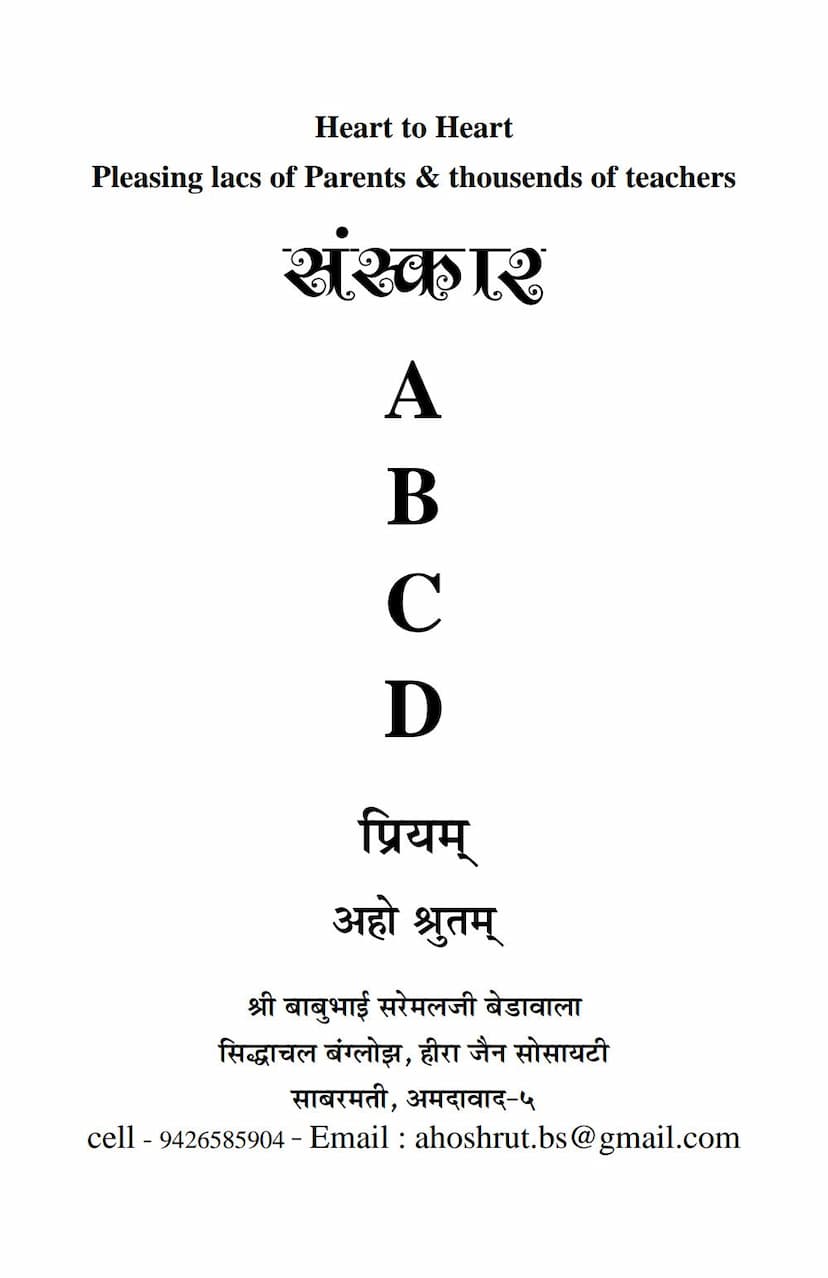Sanskar ABCD
Added to library: September 2, 2025

Summary
Here's a comprehensive summary of the Jain text "Sanskar ABCD" by Priyam, based on the provided pages:
The book "Sanskar ABCD" by Priyam, published by Ashapuran Parshwanath Jain Gyanbhandar, aims to guide readers towards a happy and fulfilling life by presenting a new interpretation of the alphabet, transforming it into a framework for developing positive life skills and values. The author emphasizes that true living isn't just about the passage of time, but about cultivating the "Art of Living."
The core message is presented through an ABCD framework:
A for Art of Living: This section highlights the importance of skillful living rather than merely existing. The author uses the example of Socrates, who, despite having a difficult wife, demonstrated the ability to remain calm and composed. The key takeaway is to control anger and passions, as "Anger is one letter short of danger." Uncontrolled anger can turn even life-giving substances like mother's milk into poison. The author advises maintaining a "cool head" (Ice Factory) and speaking sweetly (Sugar Factory). He stresses that accepting guidance from parents and teachers, even if it involves scolding, is for one's own benefit. The principle of treating others as you wish to be treated is central: "Whatever you wish for yourself, wish for others." True independence, or "Independence Day," is achieved when one's happiness is not dependent on external factors but is internally controlled. Socrates' calm reaction to his wife's actions, including being doused with water, exemplifies this "Art of Living," where happiness is a choice.
B for Bless: This signifies cultivating positive thoughts and well-wishes for everyone. The text connects this to modern science's research on aura and the power of positive thinking. It suggests that good thoughts enhance one's immune system, mental well-being, concentration, and memory. Conversely, negative thoughts weaken the body and mind. Scientific experiments are cited to show how positive emotions can influence plant growth. The author encourages readers to adopt the sentiment of "Shivamastu Sarvajagat" (May the whole world be blessed) and "Sukhino Bhavantu Jiva" (May all beings be happy). The secret to bliss lies in wishing well for others in all interactions, whether with family, teachers, or shopkeepers.
C for Care: This emphasizes looking after others, not just oneself. The author defines "care" as thinking for others and presents everyday situations as "life exams." Examples include sharing lunch with a classmate who forgot theirs, helping a blind person cross the road, donating excess belongings to the less fortunate, and assisting with household chores. The text urges readers to be grateful for what they have, rather than focusing on what they lack, especially given the widespread poverty and hunger in the world. It encourages donating to the needy, particularly during festivals, and finding joy in giving rather than receiving. The sentiment that sharing brings lifelong happiness is highlighted.
D for Discipline: This section covers discipline in three key areas:
- Home Discipline: It stresses the importance of respecting and caring for parents, acknowledging their immense sacrifices. The author recounts stories of parental love and sacrifice, urging children to reciprocate with service and gratitude. He emphasizes that causing parents pain leads to unhappiness and that children should be there for their parents in their old age, just as parents were for them. The core message is to treat parents as "gods in our home" and seek their forgiveness.
- School Discipline: Respect for teachers is presented as crucial for learning. Mocking or disrespecting teachers is seen as detrimental to one's own intellectual and personal growth. The examples of great individuals like Sachin Tendulkar, Alexander the Great, and Chhatrapati Shivaji Maharaj are used to illustrate how respect for one's guru leads to success. Teachers are seen as gateways to knowledge, and a respectful attitude towards them ensures that the effort put into education is not wasted. Students are encouraged to greet their teachers respectfully, avoid their criticism, and remember them throughout their lives, even contributing to their alma mater.
- Social Discipline: This refers to maintaining good conduct, decency, and humanity within society. The text emphasizes that society provides the framework for development and safety. It warns against cheating or exploiting society after receiving its benefits. The ideal is to serve society with a spirit of devotion, treating clients as loved ones and upholding integrity. The author uses an analogy of a zoo where a young man acts as a chimpanzee, only to discover that the other "animals" are also humans in disguise. This leads to the conclusion that one's true nature lies within. The text encourages introspection about our inner selves, suggesting that negative traits like greed, anger, deceit, and quarrelsome behavior are like internal "animals." True humanity is characterized by love, compassion, service, peace, and good manners.
In conclusion, "Sanskar ABCD" presents a practical and inspirational guide for readers, particularly young individuals, to cultivate essential life skills and virtues. By internalizing the principles of Art of Living, Blessing others, Caring for others, and Discipline in all aspects of life, one can achieve true happiness and live a meaningful existence. The book's message is deeply rooted in Indian cultural values and Jain principles of compassion and ethical living.